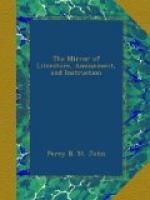“Who would abuse your sex that knows it? O Woman! were we not born of you?—should we not then honour you? Nursed by you, and not regard you? Made for you, and not seek you! And since we were made before you, should we not live and admire you as the last and most perfect work of Nature? Man was made when Nature was but an apprentice; but Woman when she was a skilful mistress of her art. By your love we live in double breath, even in our offspring after death. Are not all vices masculine, and virtues feminine? Are not the muses the loves of the learned? Do not all noble spirits follow the graces because they are women? There is but one phoenix, and she is a female. Was not the princess and foundress of good arts, Minerva, born of the brain of highest Jove, a woman? Has not woman the face of love, the tongue of persuasion, and the body of delight? O divine, perfectioned woman! If to be of thy sex is so excellent, what is it then to be a woman enriched by nature, made excellent by education, noble by birth, chaste by virtue, adorned by beauty!—a fair woman, which is the ornament of heaven, the grace of earth, the joy of life, and the delight of all sense, even the very summum bonum of man’s existence.”
Burns must have had somewhat of the same idea as that which I have underlined, when he wrote—
“Her ‘prentice han’
she tried on man,
And then she made the lasses O!”
JAC-CO.
* * * * *
THE VICTORY OF THE CID.
(For the Mirror.)
The subject of the following lines is mentioned in the traditional histories of Spain: that on one occasion, to insure victory in a nocturnal attack on the Moslem camp, the body of the Cid was taken from the tomb, and carried in complete armour to the field of battle.
Not a voice was heard at our hour of need,
When we plac’d the corse on his
barbed steed,
Save one, that the blessing
gave.
Not a light beam’d on the charnel
porch
Save the glare which flash’d from
the warrior’s torch,
O’er the death-pale
face of the brave.
We press’d the helm on his ghastly
head,
We bound a sword to the hand of the dead,
When the Cid went forth to
fight.
Oh where was Castile’s battle cry,
The shout of St. James and victory,
And the Christians stalwart
might?
The winds swept by with mournful blast,
And sigh’d through the plumes of
the dead as he past,
Through troublous skies the clouds flitted
fast,
And the moon her pale beam faintly cast,
Where the red cross banner
stream’d,
But each breeze bore the shouts of the
Moslem throng,
Each sigh was echoed by Paynim song;
Where the silvery crescent
beam’d.




